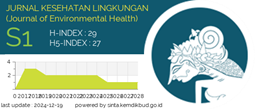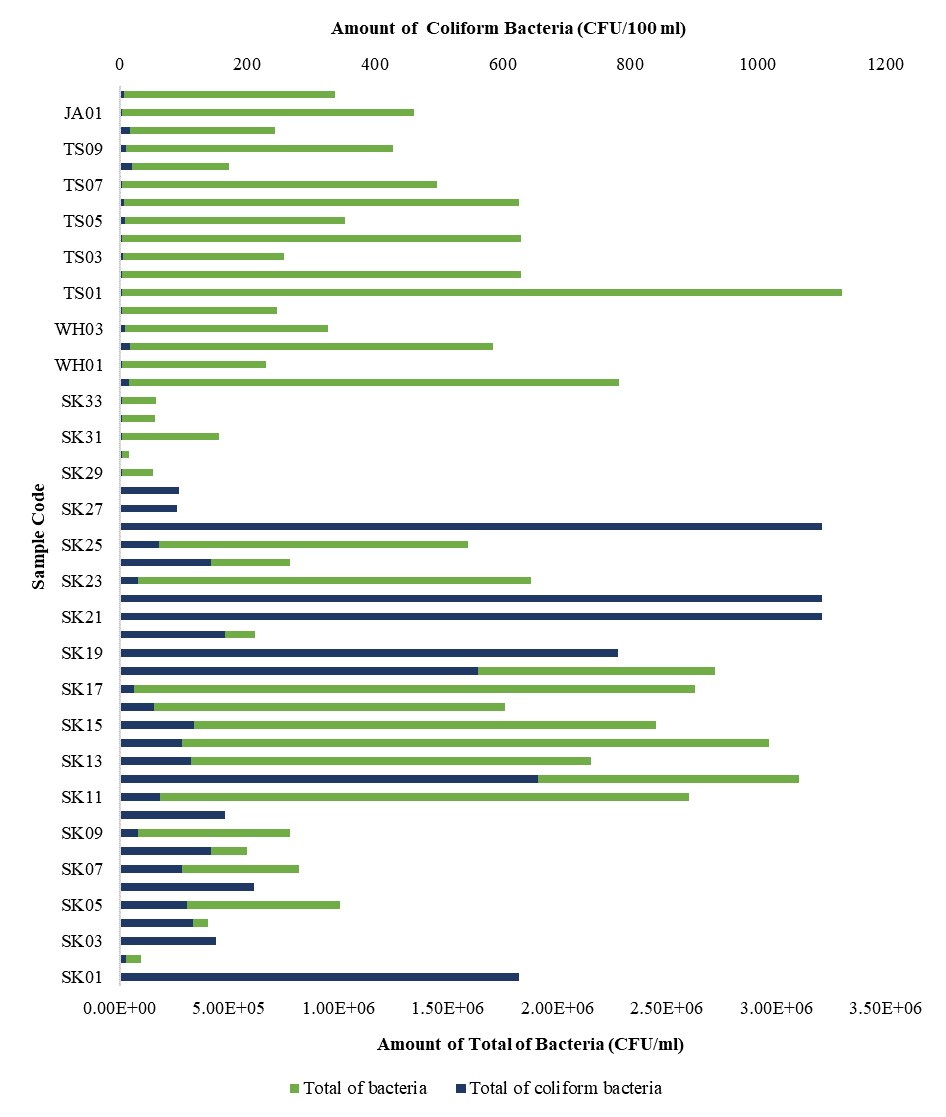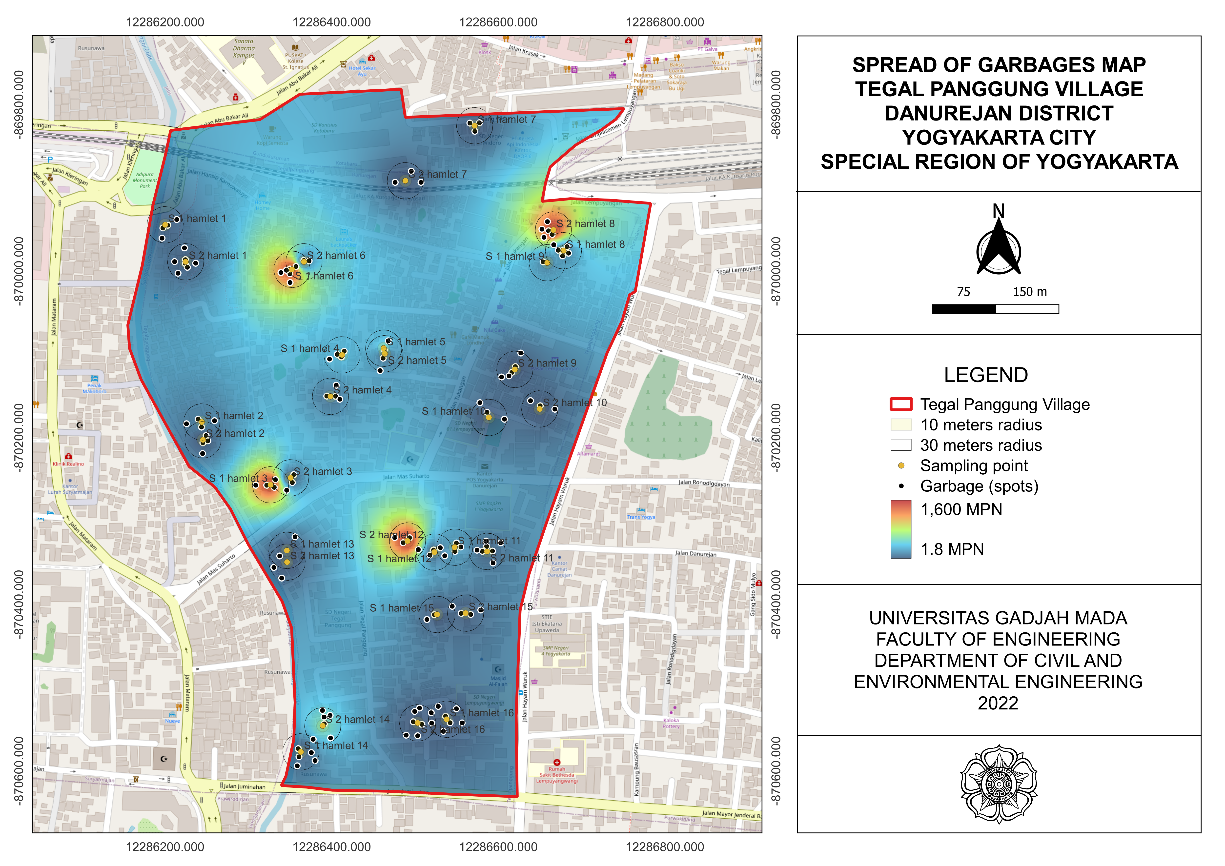Evaluation of Process on The Implementation of STBM First Pillar Stop Open Defecation in Puskesmas Seririt II Working Area
Downloads
Community Led Total Sanitation (CLTS) is a paradigm and model of a new approach to sanitation development in Indonesia that prioritizes community empowerment and behavioral change. Work area of Seririt II Public Health Center was the working area with the lowest access to the lowest latrine in Buleleng regency, which was 65.58% and there were no ODF status. The purpose of this research was to evaluate the process of actualization of CLTS first pillar program in the work area of Seririt II Community Health Center. This research was an observastional research used cross sectional study design. Data collection techniques with primary data were obtained using questionnaires. The sample of this research was sanitation officer. Data analysis used descriptive analysise. The results of the evaluation process of actualization of the Community Led Total Sanitation Program (CLTS) first pillar in the work area of Seririt II Community Health Center were not in accordance with the Minister of Health Decree Number 3 Year 2014 about CLTS, there were several steps which were not performed by sanitation officers i.e prepared village level facilitators, discussed with communities, formed sanitation activities, developed CLTS program plans related to open defecation habits, worked with cross-sector and cross-program in healthy latrine development plan and evaluated of CLTS program plan by involving community. Suggestions for this research are sanitation officers should improve the quality of trigger activities, monitoring, evaluation and assistance for other residents who still behave inappropriately to use and have adequate sanitation facilities, advocate for the sub-district head and village head to support the success of the CLTS program.
Adisasmito, (2008). Sistem Kesehatan. Jakarta : Raja Grafindo Persada
Chayatin, N dan I.M Wahid. (2009). Ilmu Kesehatan Masyarakat : Teori dan Aplikasi. Jakarta : Salemba Medika
Depkes RI. (2008). Strategi Nasional Sanitasi Total Berbasis Masyarakat. Jakarta : Departemen Kesehatan RI
Dir PL. (2013). Road Map Percepatan Program STBM. Jakarta : Ditjen PP dan PL
Dinkes Kab. Buleleng. (2017). Data Baseline dan Monev STBM Kabupaten Buleleng. Tersedia di http://stbm-indonesia.org [ 16 Mei 2017]
Ditjen PP dan PL. (2011). Pelaksanaan Sanitasi Total Berbasis Masyarakat Dalam Program PAMSIMAS. Jakarta : Kementrian Kesehatan RI dan Pokja AMPL
Farouk, D. (2016). Evaluasi Implementasi Program Sanitasi Total Berbasis Masyarakat Pilar Pertama (Stop BABS) Menggunakan Pendekatan Sistem di Puskesmas Kabupaten Probolinggo. Skripsi. Universitas Airlangga. Tersedia di : http:// repository.unair.ac.id/45623 [ 22 Mei 2017 ]
Frans, N. (2015). Menuju Pembangunan Sanitasi Berkelanjutan : Pembelajaran dari Program STBM di Provinsi Nusa Tenggara Timur. IRGSC Policy Brief No. 13 Februari 2015. Tersedia di www.irgsc.com [ 22 Mei 2017 ]
Globila, N. (2015). Evaluasi Program Sanitasi Total Berbasis Masyarakat Menuju Kelurahan Open Defecation Free di Kelurahan Dawuhan, Kecamatan Situbondo, Kabupaten Situbondo. Skripsi. Universitas Airlangga.
Kar, K dan R. Chambers. (2008). Handbook of Community Led Total Sanitation. London : Plan International UK
Kemenkes RI. (2014). Kurikulum dan Modul Pelatihan Fasilitator STBM. Tersedia di http://stbm-indonesia.org [ 16 Mei 2017]
Kemenkes RI. (2015). Rencana Strategis Kementerian Kesehatan Tahun 2015-2019. Tersedia di : http://www.depkes.go.id/resources/download/info-publik/Renstra-2015.pdf [ 16 Mei 2017 ]
Gubernur. (2016). Peraturan Gubernur Bali Nomor 67 Tahun 2016 tentang Upah Minimun Kabupaten/Kota. Bali : Gubernur Bali
Kemenkes RI. (2014). Peraturan Menteri Kesehatan RI Nomor 3 Tahun 2014 tentang Sanitasi Total Berbasis Masyarakat. Jakarta : Kementrian Kesehatan RI
Supriyanto, S dan Damayanti, N. (2007). Perencanaan dan Evaluasi. Surabaya : Airlangga University Press
Sutiyono, Shaluhiyah, Z. dan Purnami, CT. (2014). Analisis Pelaksanaan Program Sanitasi Total Berbasis Masyarakat (STBM) Sebagai Strategi Peningkatan Perilaku Hidup Bersih dan Sehat (PHBS) Masyarakat oleh Petugas Puskesmas Kabupaten Grobogan. Jurnal Manajemen Kesehatan Indonesia, Volume(02): 01. Tersedia di :http://www. download.portalgaruda.org/article.php?...Based%20Total%20Sanit [ 16 Mei 2017 ]
Solikhah, S. (2012). Hubungan Pelaksanaan Program ODF (Open Defecation Free) dengan Perubahan Perilaku Masyarakat dalam Buang Air Besar di Luar Jamban di Desa Kemiri Kecamatan Malo Kabupaten Bojonegoro. Jurnal Media Komunikasi Ilmu Kesehatan. Diakses dari : http://stikesmuhla.ac.id/wpcontent/uploads/jurnalsurya/noXVIII/84-90Jurnal-Siti.pdf [ 16 Mei 2017 ]
WHO. (2009). Water and Sanitation Program : Katalog Opsi Jamban Sehat. Jakarta : Dirjen PP dan PL
WHO/UNICEF. (2010). Progress on Sanitation and Drinking-water : 2010 Update. Geneva: WHO 2010
WHO. (2013). Weekly Epidemiological Record : Cholera. Geneva : WHO
Wijono, D. (2007). Evaluasi Program Kesehatan dan Rumah Sakit. Surabaya : CV. Duta Prima
Zastrow, C. (2008). Introduction to Social Work and Social Welfare, Empowering People. US : Thomson Brooks, Belmont
2. Formal legal provisions to access digital articles of electronic journal are subject to the provision of the Creative Commons Attribution-ShareAlike license (CC BY-NC-SA), which means that Jurnal Kesehatan Lingkungan is rightful to keep, transfer media/format, manage in the form of databases, maintain, and publish articles.
3. Published manuscripts both printed and electronic are open access for educational, research, and library purposes. Additionally, the editorial board is not responsible for any violations of copyright law.
JKESLING by UNAIR is licensed under a Creative Commons Attribution-ShareAlike 4.0 International License.







































